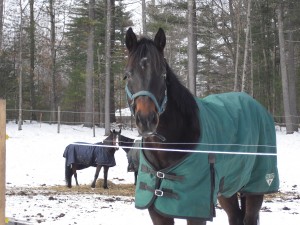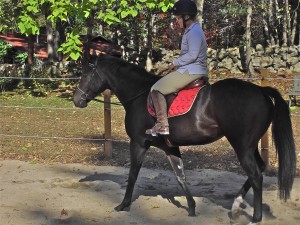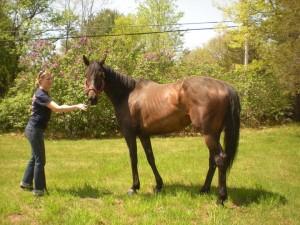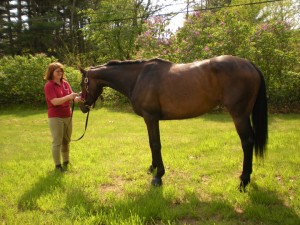At facilities across New England there are barn owners who ‘leave a stall open’ for that moment when an unwanted racehorse needs to find safe place.
And when the call for help comes, sometimes unexpectedly, activity inside a weathered structure gears up to welcome a horse nobody else wants. Bedding is put down, buckets are filled, and a plan is devised to get the ex-racehorse settled in and prepared for a new life.
It’s these foster volunteers who account for the successful transition of about 10 percent of ex-racehorse Thoroughbreds who pass through the CANTER New England program, says volunteer Kim Rigolini. They differentiate themselves by their willingness to take on a horse for an unknown duration, with little financial compensation, all for the sake of helping a horse pass safely to a new owner.
“We’ve had foster farms all over New England. Right now we have about a dozen horses in the foster program,” Rigolini says. “These people are critical. We really depend on people calling or emailing us and offering to help.”
It takes a special person and the perfect match to make a foster work, she says.
A prospective foster farm takes on responsibilities to feed, house and care for the horse. And although CANTER pays for veterinarian and farrier services, and a farm is granted a $20 daily tax write off, in Massachusetts, the tax benefit does not go very far to offset the true value of the real estate, she says. “Keeping a horse in Massachusetts can be the equivalent of paying rent on an apartment,” Rigolini says. “It’s ridiculously expensive.”
The cost makes it harder to induce people to open their barns for foster horses when they could be earning an income on stall real estate, she admits.
“Our other CANTER groups” in less costly regions of the country “actually have their own barns that are solely for these horses coming off the track,” Rigolini says. “But in Massachusetts, because it’s so expensive to board, we just don’t have that option.”
At the same time, CANTER is very strict about where it allows its horses to go. Prospective foster farms must past rigorous screenings to prove their fitness to accept a foster horse. Among other criteria, a farm must supply photographs of the barn, paddocks and other horses, she says.
Despite the obstacles, foster farms have emerged at just the right time to step up with help, she says.
Help came recently from Jennifer Clapp of Stow, Mass., and Kathy Hall of Somersworth, NH. Both women looked around their barns and knew they could help.
Last spring, Clapp had one of her two stalls open up after friend’s horse was moved out. After hearing word-of-mouth about CANTER’s foster program, she contacted the nonprofit in the spring and soon found herself welcoming Golden Days, whom she calls Daisy.
Right away the experience with Daisy was different. “ The biggest thing is that you know in the back of your mind that you’re preparing them to be someone else’s horse,” Clapp says.
But she can’t help but feel attached to Daisy. The experienced rider has taught her to go on trail rides and some dressage, and she has watched her blossom. “I think the biggest reward is seeing her turn into a different horse,” she says. “The first time I got on her, her pole was in my face. Now she walks, trots and canters in both directions. And she has a beautiful neck now!”
In Somersworth, Hall is facing the end of a long chapter with her foster Crescent Joker, or Codie. After nearly a year together, a potential buyer has visited, and a deal could be pending.
“We knew from the beginning it would be hard to let go, but it’s just been a fantastic experience,” she says. “I’ve worked as closely with Codie as I have with my own horse, and I can confidently say he’ll be a great stable horse.”
She has taught him everything from how to stand on the crossties and going well under saddle to being “loved on.”
She decided to foster because it seemed like the right thing to do. “We have the space. I just wanted to give a little something back,” she says. “For me, we put our heart and soul into that horse.”
Rigolini admits that CANTER needs more foster homes like these. Especially as the Suffolk Downs meet draws to a close, there is a high likelihood of more horses needing foster.
Anyone with a spare stall and willingness to take on a foster is urged to contact CANTER New England through its website. An application form is downloadable from the How to Help page.
“As trainers get ready to move onto more competitive tracks for the winter, they’ll be deciding which horses to take with them,” she says. “If we have a foster home available, we’ll take those horses.”





